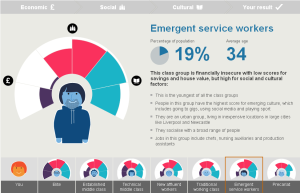 Arguing that the traditional understanding of British social divisions is out of date, the BBC has launched its class calculator.
Arguing that the traditional understanding of British social divisions is out of date, the BBC has launched its class calculator.
The BBC is right to conclude that simplistic brackets such as upper, middle and working class no longer accurately reflect 21st century occupations and lifestyles. But despite a compelling appreciation of cultural and social capital which draws on the work of Pierre Bourdieu, the Beeb’s alternative shows a poor understanding of how class actually operates.
Relying heavily on home ownership, salary and savings, the BBC takes a snapshot of people at a particular time.
But class has much more to do with a person’s background and where their background means they are likely to end up than what job they are currently in.
Conspicuously missing from the BBC poll are questions about education and family wealth and the power they convey.
Let’s take the example of Benedict Whitehall. He went through Eton and Oxford, his family own an estate in Surrey, a villa in Tuscany and a successful business empire which he stands to inherit. He’s just graduated and has landed his first job as a junior researcher at a think tank. Because the BBC’s poll takes a snapshot of his relatively low pay and the fact he doesn’t yet own a home, he is deemed to be of a lower class than a train driver on £40,000 a year with a mortgage.
But Benedict will go on to inherit millions. He will use the contacts he made at Eton and Oxford to propel him through the ranks of the think tank until he is parachuted into a safe Conservative seat and he works his way to the front benches where he will wield considerable economic and political power. By this point he will no longer be deemed an emergent service worker (second from bottom), but an elite. In this way, the BBC implies a level of social mobility which sadly doesn’t exist in society for all that has happened in the last decades to break down traditional class structures. Benedict was born an elite and he will die an elite.
And what of the media which is meant to hold these elites to account? Most journalists must spend their first couple of years working for free building up credits and contacts to break into the industry. Working for little to no money and renting expensive London accommodation, the BBC’s class calculator would place them at the bottom of the heap in the precariat. But how many of those journalists are eking out their precarious existences without generous parental support? Is the media really as open as the BBC would seem to be suggesting to such poor, disenfranchised people?
Of course there will be vast numbers of people who have not had these opportunities and whose life paths will remain frozen in the snapshot the BBC has taken. And this is the real social divide which exists with out-of-touch millionaire politicians and their media pals.
But for the middle and upper classes, the BBC has produced little more than an age poll which ignores background and potential to inaccurately portray a fictional social mobility.
This article was originally written for Liberal Conspiracy
All my old school contacts are useless. None of them has ever given me a job. If I’m going to rely on nepotism it will probably whatever nuggets you can toss me Sal…
I’ve tossed you plenty of nuggets, you never pick them up. Actually there might be something. Are you looking for gainful employment?
Maybe – I do need to finish the play first though.
Ok, well I’ll let you know of any job opportunities coming up in 2143 then.